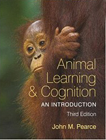
Animal Learning and Cognition: An Introduction
This is probably the best of the more serious introductions to Animal Learning and Cognition, in that it both has academic rigour, and is relatively easy to read, even for a non-biologist. It's easy to find your way around the text, and illustrations make reading the book more enjoyable. Information is presented in bite-sized chunks, which makes this a good book for getting to grips with the topic. The original book was so popular that it has now run to this third edition. There are more changes in the second part, relating to animal cognition, than to the first part, relating to learning. This reflects the rapid development of research on animal cognition. 'Animal Learning and Cognition' is also backed by by online resources such as multiple-choice questions - useful for people teaching the subject looking for course materials, as well as for students.
The book starts off with an historical account of how animal intelligence has been studied, including Pavlovian and instrumental conditioning, then moves on from traditional learning theory to new areas of research in animal cognition like memory, spatial behavior including navigation in insects, imitation, communication and language, and social cognition.
One refreshing feature of this book is that Pearce is not dogmatic, unlike, for example, Wynne, but gives his readers space to think for themselves. This is very useful in a field which is still young in academic terms. Readers with a strong attachment to learning theory may want greater depth, however the greatest value of this book lies in its clear presentation of Animal Cognition.
One exciting feature of new research on animal intelligence is that it has brought together people from different academic disciplines, such as biology and neuroscience, as well as psychology. Pearce has to write clearly to make his work accessible to students from different academic fields. It is clear enough for readers who are literate, but do not have a specialist background in these subjects, but are simply interested in animal intelligence.


